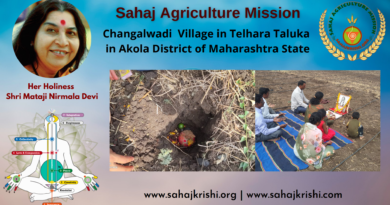Sahaj Agriculture – Plan of Action for next 10 years (2021-2030)
Sahaj Agriculture – Plan of Action for next 10 years (2021-2030)
After taking inputs from the recommendations of various National Seminars on Sahaja Agriculture, following Plan of Action for spread of Sahaja Agriculture in India and globally during next 10 years (2021-2030) is proposed, which is subject to be reviewed from time to time by the experts:
| Sr. No | Plan of Action | Remarks | Action |
| Constitution of Sahaja Agriculture Committees at 1. National, 2. State, 3. District and 4. Block levels | 1.Committee Members should be Sahajayogi, preferably retired officials and scientists/ Progressive farmers of Agriculture/horticulture/ animal husbandry etc. | Country In-charge of National Sahaja Agriculture Project | |
| The State Coordinator of Sahajayoga should recommend the name of State Sahaja Agriculture Coordinator to Central Committee of Sahaja Agriculture Project | The State Sahajayoga Coordinator | ||
| The district level Sahaja Agriculture Committees will be constituted by State Sahaja Agriculture Coordinator in consultation with district Sahajayoga Coordinator | State Sahaja Agriculture Coordinator | ||
| The Block level Sahaja Agriculture Committees will be constituted by District Sahaja Agriculture Coordinator with Block level Sahajayoga Coordinator | District Sahaja Agriculture Coordinator | ||
| Preparation and transmission of training materials to various states | The uniform package and practices, posters, pamphlets, video films, CDs etc. to be prepared SAP and provided to state/district/Block Coordinators through post and email. | National Expert Committee of SAP, comprising various disciplines | |
| To continue experiments on Sahaja Agriculture in 10 NRCs of ICAR | The Core Committee of SAP will collect the inputs and will continues the experiments through State Coordinators. | State Coordinators | |
| Continue efforts to engage State Agricultural Universities and institutes of ICAR in research & training | Contact the State Agriculture universities/ICAR institutes etc. Research on different crops validation of Sahaja Agriculture at Research Farms and Establish demonstration trials for training of farmers on Sahaja Agriculture through their Krishi Vigyan Kendras.Conduct training programmes during the trainings and Extension programmes often done by universities/institutes.Diversify the research on effect of vibrations on yield and control of diseases of local crops of Agriculture, Horticulture, Forestry, medicinal plants, vermicompost, animal husbandry, poultry, fisheries and bee keeping etc.One scientist, nominated as “Nodal Officer” at each of NRCs and Agriculture Universities be entrusted with the responsibility of closely observing these experiments. | State Coordinators (Through District Coordinator) | |
| Publish the results of Sahaja Agriculture | The scientists universities/ICAR institutes should submit the research papers on research findings for publication in reputed international and national journals. The technical problem of term “divine vibrations” not acceptable to scientific journals may be replaced with “electromagnetic vibrations” till there is a solution at the level of journal. | The State Coordinators | |
| Policy intervention at government level | Make visits of policy makers and senior government officers to experimental fields at research institutions and farmers’ fields for their education.Submit and pursue the policy change for acceptance of Sahaj Agriculture as “Part of Zero budget Natural Agriculture/Horticulture etc.” at Central and State Government level through scientific evidences of scientific publications and recommendations of Research organizations | ||
| Global Network of Sahaja Agriculture | The Director of SAP will develop global e-network of Sahaja Agriculture of all nations and share training materials etc. and results of sahaja Agriculture conducted at research organizations and farmers’ fields. | The Director/Incharge of SAP | |
| National Network of Sahaja Agriculture | SAP will be connected with State Coordinators through, telephone, whatsapp and email. | The Director/Incharge of SAP | |
| Newsletter on Sahaja Agriculture | 1.A monthly Newsletter will be published providing information on the trainings/workshops, brief information on research findings, future events etc. 2.The Newsletter will be distributed globally and in India to State/district/Block Coordinators through email. | The Director/Incharge of SAP | |
| Preparation of recommendations for adoption by deve;lopment agencies | Scientists of univesrities/institutes to prepare the recommendations based on research finding of the trials on Agriculture/horticulture etc. and submit with evidences to SAP. | The State Coordinators | |
| Upscaling of Sahaja Agriculture through Department of Agriculture/Horticulture etc. | Scientists to recommend and provide literature and train Agriculture Officers (ADO etc.) In sahaja Agriculture at university/institute/farmers fields in collaboration with District/Block Coordinator of Sahaja AgricultureThe ADO etc. will train the farmers in collaboration with District/Block Coordinator of Sahaja AgricultureTo spread Sahaja Krishi in all 33 states.Three districts in each state will be selected.Sahaja agriculture Expansion in 10-12 tehsils and 300-400 villages of each state. Revise and make realistic targets achievable. Teams of experts at District/Block level in each state.There will be 3-4 members in each team.The team should also comprise local progressive farmersFix and revise the targets achievable.Raise and share resources to organize the workshop/training locally in collaboration department of Agriculture/Horticulture/ Animal Husbandry etc. | The State Coordinators | |
| Popularization of success stories | Prepare the documents and films of some success stories and distribute them globally and in different states with large impacts | The director of SAP | |
| “Sahaja Agriculture Awareness Rath Yatra” | Launching of nationwide “Sahaja Agriculture Awareness Rath Yatra” in the country learning from the experience of “Sahajayoga Rath Yatra”. | The Director of SAP | |
| Organize the Seminar/Conferences | To organize the Global the Seminar/Conferences after every 4 years in nations like India, Russia, China, Germany etc. | The director of SAP | |
| National Seminars/Conferences | To organize the National Seminars/Conferences after every 2 years | The director of SAP | |
| Annual State Workshop | To organize the state and district levels workshops before the start of the kharif and rabi seasons (Pre seasonal Sahaja Agriculture seminars/Workshops) in collaboration with local university/institute/Department of Agriculture/Horticulture/Forestry/Animal Husbandry | The State Coordinators | |
| To identify the serious agricultural issues | To identify the serious agricultural issues in each state Prepare the Work plan to carry out research to address those issues. | The State Coordinators | |
| To organize Farmers’ Field Days | To organize Farmers’s Field Days on Sahaja Agriculture to address the issues of the farmers by District/Block Coordinators in collaboration with Local departments of Agriculture etc. | The State Coordinators | |
| To make documentary film on Sahaja Agriculture | Making a documentary film on Sahaja Agriculture after collecting all inputs on research and training and experiences of farmers. | The director of SAP | |
| Inclusion in syllabus of schools/college | To get the Sahaja Agriculture included in the syllabus of schools, colleges and universities on the pattern of inclusion of sahajayoga meditation in MBBS after publication of data of scientists in Agriculture journals. | The director of SAP | |
| Toll free service | To start the Toll free service on Sahaja Agriculture. | The Director of SAP | |
| To establish Printing press | To establish Printing press on Sahaja Agriculture at National level for publication few copies of newsletters, Annual reports, progress reports, circulars of seminar and workshops etc. | The Director of SAP |




